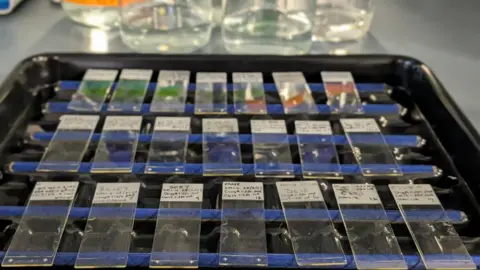James GallagherHealth and science correspondent
 Nye family
Nye familyScientists have discovered why type 1 diabetes is more severe and aggressive when it develops in young children.
Type 1 is caused by the immune system attacking cells in the pancreas that control blood sugar levels.
The research team showed the pancreas was still developing in childhood, particularly under the age of seven, making it far more vulnerable to damage.
They say newly developed drugs could buy patients time for the pancreas to mature, delaying the disease.
Type 1 diabetes affects around 400,000 people in the UK.
Gracie, age eight from Merseyside, became suddenly ill on Halloween in 2018. It started as a slight cold, but rapidly escalated.
“She went from being a very happy one-year-old, who would go to nursery and dance and sing, to almost dying in less than 48 hours,” says dad Gareth.
“The diagnosis remains the worst part of our life.Suddenly everything we took for granted was 10-20 times harder,” he says.
 Nye family
Nye familyThe Nye family had to adapt quickly – keeping on top of everything Gracie had to eat or drink, checking blood sugar levels and giving the hormone insulin to tell her body to absorb the sugar in her blood.
Gracie now has a glucose monitor and an insulin pump and is “bossing diabetes”, says her dad.
“Gracie’s a superstar,” he adds.
But why children diagnosed young like Gracie, especially those under the age of seven, have a more aggressive disease than those diagnosed in their teenage years or later, has remained a mystery.
The study, published in the journal Science Advances, shows it is down to the development of the beta cells living in the pancreas.
These are the cells that release the hormone insulin when sugar levels rise in the blood after we eat.
Researchers at the University of Exeter studied pancreas samples from 250 donors, allowing them to see how the beta cells formed normally as people got older, and in type 1 diabetes.
 Diabetes UK
Diabetes UKEarlier in life these beta cells were shown to exist as small clusters or as individual cells, but as we age they grow in number and mature into larger groups known as Islets of Langerhans.
The study was able to see what happened after the immune system turned against a patient’s own beta cells.
Beta cells in small clusters were picked off and destroyed so they never had the chance to mature.
Those in larger islets were still attacked, but were more durable allowing patients to still produce low levels of insulin which reduced the severity of their disease.
“I think this is a really significant finding for type 1 diabetes – this research really sheds light on why the disease is more aggressive in children,” Dr Sarah Richardson, from the University of Exeter, told the BBC.
She said “the future is much brighter” for children being diagnosed with type 1 now.
This includes the possibility of screening healthy children for the disease and of new immunotherapy drugs to delay it.
The UK has licensed teplizumab – an immunotherapy that can stop the immune system attacking beta cells and may be able to give them time to mature – although it is not available on the NHS.
“Because we have new drugs for the treatment of type 1 diabetes in children, we hope that these will be able to prevent or delay the onset in those young people,” said Dr Richardson.
Missing piece of the puzzle
The research was part of the Type 1 Diabetes Grand Challenge organised by the Steve Morgan Foundation, Diabetes UK, and Breakthrough T1D.
Rachel Connor, director of research partnerships at Breakthrough T1D, said: “This study gives us a missing piece of the puzzle, explaining why type 1 diabetes progresses so much faster in children than in adults.”
Dr Elizabeth Robertson, director of research and clinical at Diabetes UK, said: “Uncovering why type 1 diabetes is so aggressive in young children opens the door to developing new immunotherapies aimed at slowing or stopping the immune attack, potentially giving children more precious years without insulin therapy and, one day, preventing the need for it entirely.”



